Daniel Davey lives up to his healthy reputation. In the cafe he doesn’t opt for a coffee, but a bottle of kombucha, a fermented sweet tea consumed primarily for its health benefits.
Daniel is a sports performance nutritionist, working with Leinster rugby and the Dublin senior footballers, as well as seeing individual clients in his clinic. Further feathers in his cap include being the resident nutritionist on Virgin Media’s Doctor in the House, a qualified strength and conditioning coach and having an impressive social media following under his Food Flicker brand.
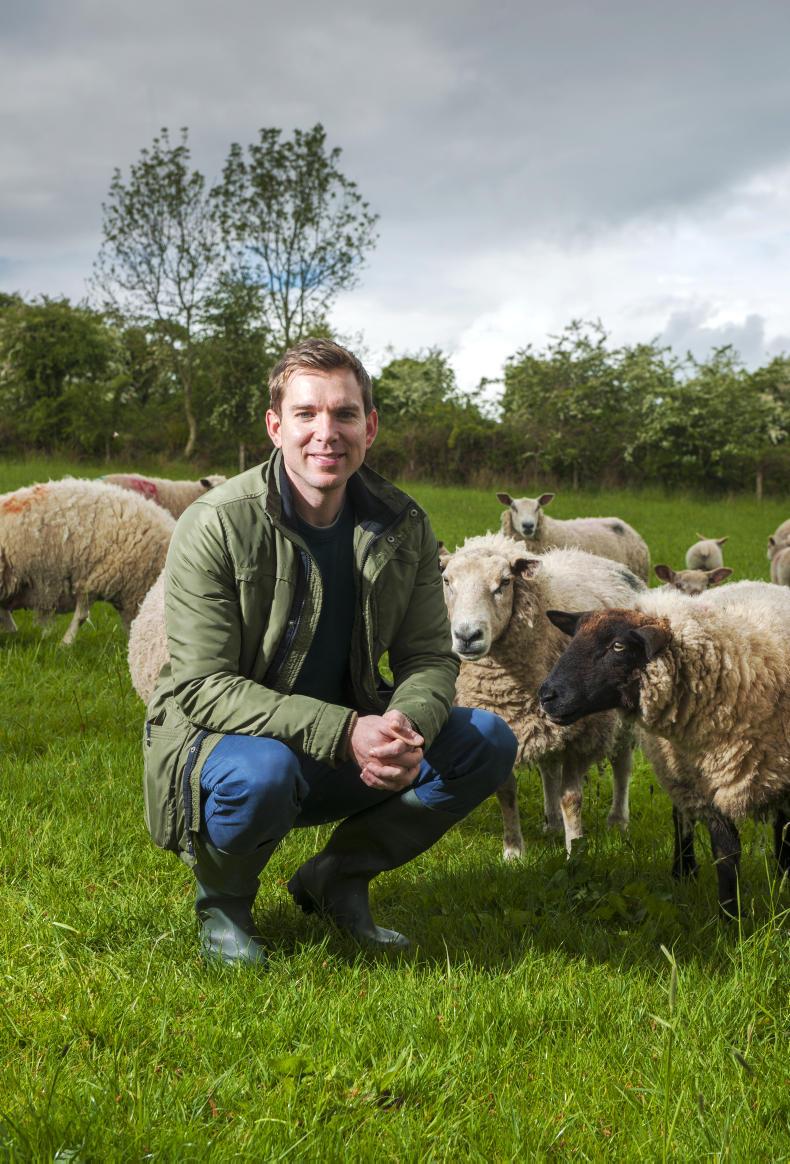
Oh, and let’s not forget – most importantly – he’s a sheep farmer from Co Sligo. Although his current farmer status – due to his hectic schedule in the capital (he gets home about every two weeks) – may amuse some.
“I get a lot of stick about this, but I call myself a full-time distance farmer,” smiles Daniel.
“Well, I’m checking in on my sheep through WhatsApp and Snapchat. My father is mainly minding them, but my mother also got some Zwartbles, so she has gotten more interested in the farm over the last couple of years. She’s better for sending me updates and videos.”
Early days
Growing up in Chaffpool outside Tubbercurry, there were two things Daniel took to from a young age: farming and football. For him, these interests were inextricably linked. On both his parents’ farm and his grandparents’ dairy farm, where he spent much of his time, there was good-quality food produced. Food that could make you faster and stronger and, thus, perform better on the pitch.

Ultimately this strategy worked out well for Daniel’s own Gaelic football career. As well as playing with the Sligo senior team, he also won two Dublin county titles and in 2016 he won an elusive club All-Ireland with Ballyboden St Enda’s. Following this he retired from the Dublin scene and returned to his home club for a further two years.
Daniel’s formative years had a profound influence on his food philosophy. Getting back to the wholesome food people were brought up on, hence cutting out processed food, is something he feels is imperative that we strive for as a nation.
“The meal I ate five times a week for my entire childhood was bacon, cabbage, turnips and potatoes, then fish on Friday and roast chicken on Sunday. I spent most of my time with my grandparents and that’s what they gave me,” says Daniel.

Daniel Davey with his nieces Jane, Rachel and Sarah Davey. \ Michael McLaughlin
“The critical thing about my upbringing was that treats were actually treats. Of course there was a treat cupboard, but you didn’t get access to it every evening. It was only when the turf was in, the jobs were done on the farm, then you could sit down.”
When it was time to decide what he would do after school, Daniel was torn between veterinary and general science, so he decided to meet halfway and study agricultural science at UCD.
In the end, the course suited Daniel well as it made him realise his interest lay more on the food science side of things and he was able to focus more in this area. During his final two years he did three extra pass/fail exams, which allowed him to go on and do a master’s in nutrition at the University of Bristol.
Elite sport
After finishing his master’s, Daniel quickly realised that job opportunities in nutrition, particularly 10 years ago, were hard to come by.
With sport always a keen interest, he decided to qualify as a strength and conditioning coach, an area that was growing rapidly. The marriage of nutrition with strength and conditioning proved to be a niche from which he could work.
Like many, Daniel’s first job was not one that he wanted, but it stood him in good stead all the same.

“I never wanted to work in the sports supplement industry, but that’s where I ended up getting my first job, helping to form a nutrition brand.
“As it happens, it gave me an incredible insight into the industry and to this day I use my experience and knowledge from the time spent in that business. I didn’t know it then, but I couldn’t have gotten a better form of experience. 
All I wanted to do was work in sport, but I didn’t realise that you can’t just jump into sport.”
While in this job, Daniel also worked on nutrition with various club teams, starting with Ballyboden St Enda’s, whom he was playing with. From there he got a job with the Dublin hurlers, staying with them for a season.
When the position of performance nutritionist came up for both the Dublin footballers and Leinster rugby at the end of 2012, he didn’t hesitate in applying for both, landing his dream job twice over.
Simple changes
In working with sports teams it is all about the small margins, but for the everyday population, simple changes can make a huge difference. In terms of farmers’ nutrition, Daniel says they know how to produce good-quality food, so that should be utilised alongside limiting treats.
“Farmers know a lot about food, they know how to produce extremely good food. I think some don’t take enough responsibility or ownership for their own health. I think some don’t actually make enough food choices based on what they are producing, which is really the highest quality food in the world,” explains the nutritionist.
“Some might be having a nutritious breakfast, they might be having their porridge, they might be having their brown bread sandwiches at lunch time and they might be having their vegetables and potatoes in the evening, but they are also eating biscuits with their tea. They’ve got a sweet tooth.

“Before we had an extremely labour-intensive workload, now machinery forms a large part of our day-to-day work. Farmers are doing far less walking, we have things like quads and more time spent in the seat of the tractor.
“On one hand, of course I appreciate that farm management is critical for farming’s evolution and sustainability, but farmers also need to realise that if they don’t adapt what they are eating, then the state of farmers’ health is going to deteriorate.”
Daniel’s advice in general is to go back to basics with food, back to the concept that fuelled his passion for football.
“Let’s go back to what we were raised with, let’s go back to what we have very strong beliefs in. Let’s not just go with the trend. Go back to your porridge and milk. Have your eggs with some brown bread. Don’t eat the cheapest bread you can find, that’s going to be there for the week and it’s not even mouldy because there are so many additives in it.

“It’s food that goes off quickly, that’s fresh and that provides a high level of nutrition, that’s what we need. Move into a mindset of investment in the right type of foods, because it’s an investment in you, your family and your wellbeing.”

Top tips from Daniel DaveyAlthough Daniel stresses that when giving nutrition advice it must be specific to a person or family unit, he says that these top tips can be implemented by just about anybody.
1 Cut out liquid calories: I’m not talking about a glass of milk here, I’m talking about fizzy drinks or anything that contains added sugars. If fizzy drinks are coming into the home that’s a very simple change to make.
2 Utilise the quality of your own meats: That means not eating heavily processed meats too often. Whether we like it or not, processed meats are something we know are detrimental to our health. Heavily processed meats, three times a week, is really the maximum you should be aiming to eat them. Look at utilising the cuts from your own farm if possible.
3 Swaps: When you are looking to change a habit, you are not looking to completely cut out a habit, you are looking to change what is being consumed. A little insight: a very close relation of mine used to have a big slice of apple tart in the evenings. But instead what he’s doing now is he’s making my porridge bread with blueberries (see recipe on the previous page).
4 Simple changes: Like choosing more wholegrains. Moving to a homemade brown bread or a purchased wholemeal brown bread would be a simple change. You are getting more fibre and it’s going to make a big difference to how you feel and your energy levels.
5 Ownership: Start taking ownership of the food you are eating. Even if you are not cooking it, that you are actually more involved in what’s going to be made for the dinners and the other meals, because you actually start to think about it then.
Recipes the family will love

Porridge bread with mixed seeds.
Porridge bread with mixed seeds
Everyday snack option.High-fibre snack option.Good natural source of protein. This is an extremely simple but versatile bread that can be used as an accompaniment to breakfast or used for lunch. Oats make up the majority of the ingredients and are a slow releasing energy source, which makes this bread an ideal snack or main meal option, particularly when combined with a protein source like eggs or meat.
1 tub natural yogurt (400ml)
350g oats or 2 yoghurt tubs of porridge oats (use the empty yoghurt tub to measure out 2 full tubs of oats)
½ tsp salt
1 tbsp honey
2 tsp of bread soda
5 tbsp blueberries
2 eggs
3 tbsp of chia seeds, sunflower seeds and pumpkin seeds
1 Preheat the oven to 180°C. Grease/line a 9×5-inch loaf pan.2 In a bowl, mix together the oats, bread soda and salt.3 Whisk the eggs. 4 Add the eggs and yoghurt to the oats mixture. Stir until well combined and no dry oats are left.5 Next, fold in the blueberries and mix well.6 Pour your mix into the loaf tin.7 Put it in the oven for 65 minutes (at about 45 minutes, sprinkle some porridge oats and the seeds on top).8 Take it out and carefully remove from the loaf tin, set aside and allow to cool. 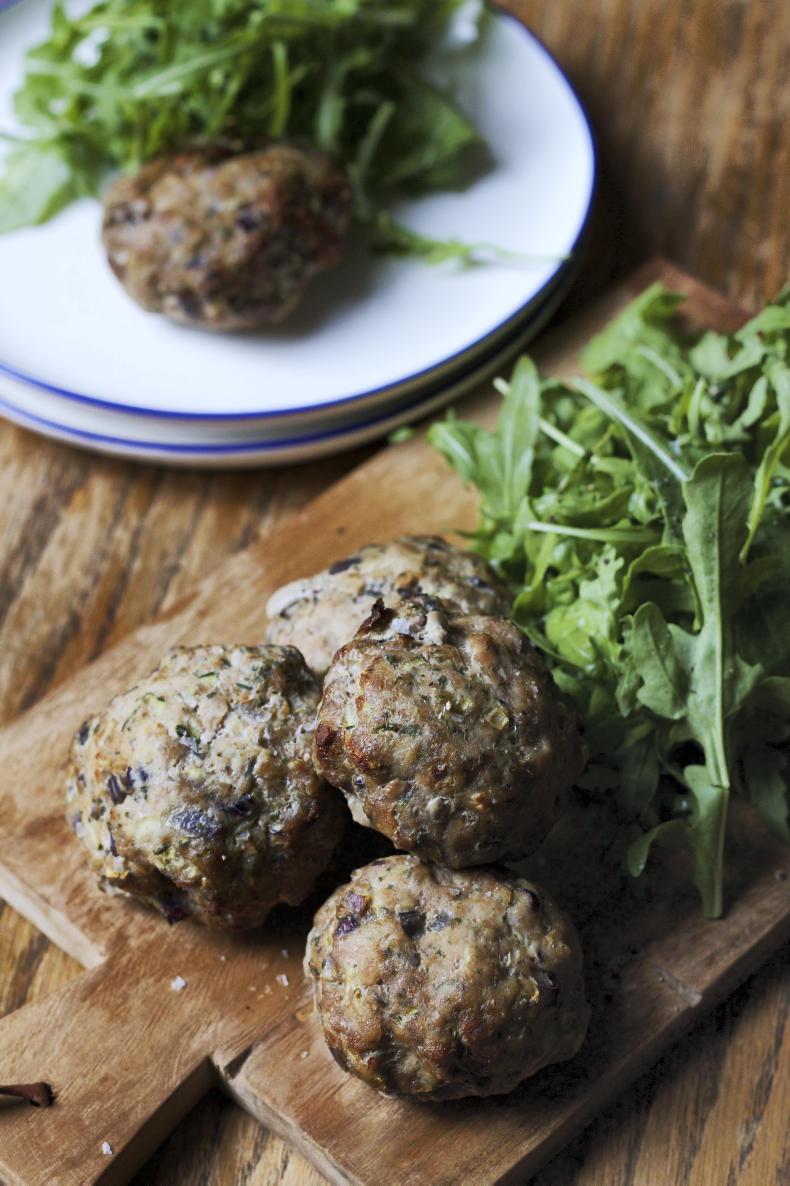
Lamb burgers.
Lamb burgers
400g minced lamb
60g finely chopped onion - 1 small onion
20g butter
2 tbsp ground coriander
2 tbsp ground cumin seeds
½ an egg beaten
Salt and pepper to season
1 tbsp rapeseed oil
1 In a non-stick pan cook the onions in 20g of butter at a very low heat until soft – 10 minutes or so. Leave to cool for 10 minutes in the fridge on a plate (the flatter the better, they’ll cool faster).2 Meanwhile, in a bowl, mix all the other ingredients.3 Once the onions have cooled, mix them all together with the meat and spices.4 Form into medium-sized patties/burgers.5 Place a non-stick pan on a medium heat and add some rapeseed oil.6 Place the burgers on the pan and seal on both sides – two minutes each side. 7 Remove the burgers from the pan, place on a baking dish and put them into the oven for 20 minutes to cook fully. 8 Serve with your choice of vegetables.
Daniel Davey lives up to his healthy reputation. In the cafe he doesn’t opt for a coffee, but a bottle of kombucha, a fermented sweet tea consumed primarily for its health benefits.
Daniel is a sports performance nutritionist, working with Leinster rugby and the Dublin senior footballers, as well as seeing individual clients in his clinic. Further feathers in his cap include being the resident nutritionist on Virgin Media’s Doctor in the House, a qualified strength and conditioning coach and having an impressive social media following under his Food Flicker brand.

Oh, and let’s not forget – most importantly – he’s a sheep farmer from Co Sligo. Although his current farmer status – due to his hectic schedule in the capital (he gets home about every two weeks) – may amuse some.
“I get a lot of stick about this, but I call myself a full-time distance farmer,” smiles Daniel.
“Well, I’m checking in on my sheep through WhatsApp and Snapchat. My father is mainly minding them, but my mother also got some Zwartbles, so she has gotten more interested in the farm over the last couple of years. She’s better for sending me updates and videos.”
Early days
Growing up in Chaffpool outside Tubbercurry, there were two things Daniel took to from a young age: farming and football. For him, these interests were inextricably linked. On both his parents’ farm and his grandparents’ dairy farm, where he spent much of his time, there was good-quality food produced. Food that could make you faster and stronger and, thus, perform better on the pitch.

Ultimately this strategy worked out well for Daniel’s own Gaelic football career. As well as playing with the Sligo senior team, he also won two Dublin county titles and in 2016 he won an elusive club All-Ireland with Ballyboden St Enda’s. Following this he retired from the Dublin scene and returned to his home club for a further two years.
Daniel’s formative years had a profound influence on his food philosophy. Getting back to the wholesome food people were brought up on, hence cutting out processed food, is something he feels is imperative that we strive for as a nation.
“The meal I ate five times a week for my entire childhood was bacon, cabbage, turnips and potatoes, then fish on Friday and roast chicken on Sunday. I spent most of my time with my grandparents and that’s what they gave me,” says Daniel.

Daniel Davey with his nieces Jane, Rachel and Sarah Davey. \ Michael McLaughlin
“The critical thing about my upbringing was that treats were actually treats. Of course there was a treat cupboard, but you didn’t get access to it every evening. It was only when the turf was in, the jobs were done on the farm, then you could sit down.”
When it was time to decide what he would do after school, Daniel was torn between veterinary and general science, so he decided to meet halfway and study agricultural science at UCD.
In the end, the course suited Daniel well as it made him realise his interest lay more on the food science side of things and he was able to focus more in this area. During his final two years he did three extra pass/fail exams, which allowed him to go on and do a master’s in nutrition at the University of Bristol.
Elite sport
After finishing his master’s, Daniel quickly realised that job opportunities in nutrition, particularly 10 years ago, were hard to come by.
With sport always a keen interest, he decided to qualify as a strength and conditioning coach, an area that was growing rapidly. The marriage of nutrition with strength and conditioning proved to be a niche from which he could work.
Like many, Daniel’s first job was not one that he wanted, but it stood him in good stead all the same.

“I never wanted to work in the sports supplement industry, but that’s where I ended up getting my first job, helping to form a nutrition brand.
“As it happens, it gave me an incredible insight into the industry and to this day I use my experience and knowledge from the time spent in that business. I didn’t know it then, but I couldn’t have gotten a better form of experience. 
All I wanted to do was work in sport, but I didn’t realise that you can’t just jump into sport.”
While in this job, Daniel also worked on nutrition with various club teams, starting with Ballyboden St Enda’s, whom he was playing with. From there he got a job with the Dublin hurlers, staying with them for a season.
When the position of performance nutritionist came up for both the Dublin footballers and Leinster rugby at the end of 2012, he didn’t hesitate in applying for both, landing his dream job twice over.
Simple changes
In working with sports teams it is all about the small margins, but for the everyday population, simple changes can make a huge difference. In terms of farmers’ nutrition, Daniel says they know how to produce good-quality food, so that should be utilised alongside limiting treats.
“Farmers know a lot about food, they know how to produce extremely good food. I think some don’t take enough responsibility or ownership for their own health. I think some don’t actually make enough food choices based on what they are producing, which is really the highest quality food in the world,” explains the nutritionist.
“Some might be having a nutritious breakfast, they might be having their porridge, they might be having their brown bread sandwiches at lunch time and they might be having their vegetables and potatoes in the evening, but they are also eating biscuits with their tea. They’ve got a sweet tooth.

“Before we had an extremely labour-intensive workload, now machinery forms a large part of our day-to-day work. Farmers are doing far less walking, we have things like quads and more time spent in the seat of the tractor.
“On one hand, of course I appreciate that farm management is critical for farming’s evolution and sustainability, but farmers also need to realise that if they don’t adapt what they are eating, then the state of farmers’ health is going to deteriorate.”
Daniel’s advice in general is to go back to basics with food, back to the concept that fuelled his passion for football.
“Let’s go back to what we were raised with, let’s go back to what we have very strong beliefs in. Let’s not just go with the trend. Go back to your porridge and milk. Have your eggs with some brown bread. Don’t eat the cheapest bread you can find, that’s going to be there for the week and it’s not even mouldy because there are so many additives in it.

“It’s food that goes off quickly, that’s fresh and that provides a high level of nutrition, that’s what we need. Move into a mindset of investment in the right type of foods, because it’s an investment in you, your family and your wellbeing.”

Top tips from Daniel DaveyAlthough Daniel stresses that when giving nutrition advice it must be specific to a person or family unit, he says that these top tips can be implemented by just about anybody.
1 Cut out liquid calories: I’m not talking about a glass of milk here, I’m talking about fizzy drinks or anything that contains added sugars. If fizzy drinks are coming into the home that’s a very simple change to make.
2 Utilise the quality of your own meats: That means not eating heavily processed meats too often. Whether we like it or not, processed meats are something we know are detrimental to our health. Heavily processed meats, three times a week, is really the maximum you should be aiming to eat them. Look at utilising the cuts from your own farm if possible.
3 Swaps: When you are looking to change a habit, you are not looking to completely cut out a habit, you are looking to change what is being consumed. A little insight: a very close relation of mine used to have a big slice of apple tart in the evenings. But instead what he’s doing now is he’s making my porridge bread with blueberries (see recipe on the previous page).
4 Simple changes: Like choosing more wholegrains. Moving to a homemade brown bread or a purchased wholemeal brown bread would be a simple change. You are getting more fibre and it’s going to make a big difference to how you feel and your energy levels.
5 Ownership: Start taking ownership of the food you are eating. Even if you are not cooking it, that you are actually more involved in what’s going to be made for the dinners and the other meals, because you actually start to think about it then.
Recipes the family will love

Porridge bread with mixed seeds.
Porridge bread with mixed seeds
Everyday snack option.High-fibre snack option.Good natural source of protein. This is an extremely simple but versatile bread that can be used as an accompaniment to breakfast or used for lunch. Oats make up the majority of the ingredients and are a slow releasing energy source, which makes this bread an ideal snack or main meal option, particularly when combined with a protein source like eggs or meat.
1 tub natural yogurt (400ml)
350g oats or 2 yoghurt tubs of porridge oats (use the empty yoghurt tub to measure out 2 full tubs of oats)
½ tsp salt
1 tbsp honey
2 tsp of bread soda
5 tbsp blueberries
2 eggs
3 tbsp of chia seeds, sunflower seeds and pumpkin seeds
1 Preheat the oven to 180°C. Grease/line a 9×5-inch loaf pan.2 In a bowl, mix together the oats, bread soda and salt.3 Whisk the eggs. 4 Add the eggs and yoghurt to the oats mixture. Stir until well combined and no dry oats are left.5 Next, fold in the blueberries and mix well.6 Pour your mix into the loaf tin.7 Put it in the oven for 65 minutes (at about 45 minutes, sprinkle some porridge oats and the seeds on top).8 Take it out and carefully remove from the loaf tin, set aside and allow to cool. 
Lamb burgers.
Lamb burgers
400g minced lamb
60g finely chopped onion - 1 small onion
20g butter
2 tbsp ground coriander
2 tbsp ground cumin seeds
½ an egg beaten
Salt and pepper to season
1 tbsp rapeseed oil
1 In a non-stick pan cook the onions in 20g of butter at a very low heat until soft – 10 minutes or so. Leave to cool for 10 minutes in the fridge on a plate (the flatter the better, they’ll cool faster).2 Meanwhile, in a bowl, mix all the other ingredients.3 Once the onions have cooled, mix them all together with the meat and spices.4 Form into medium-sized patties/burgers.5 Place a non-stick pan on a medium heat and add some rapeseed oil.6 Place the burgers on the pan and seal on both sides – two minutes each side. 7 Remove the burgers from the pan, place on a baking dish and put them into the oven for 20 minutes to cook fully. 8 Serve with your choice of vegetables. 













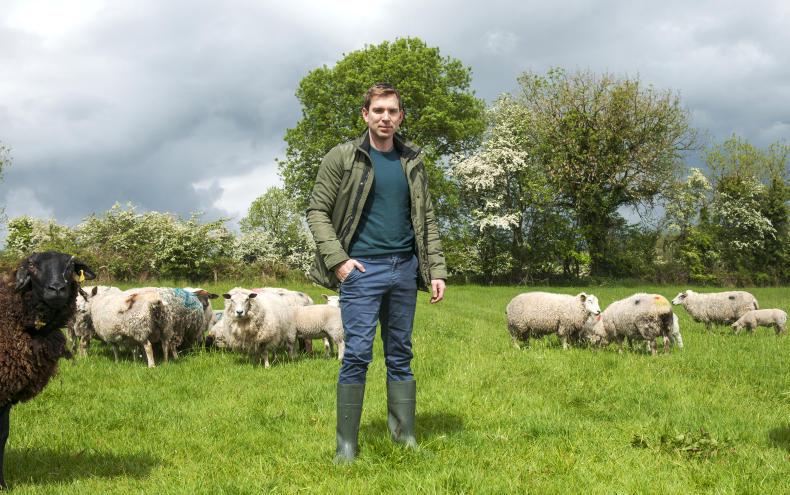
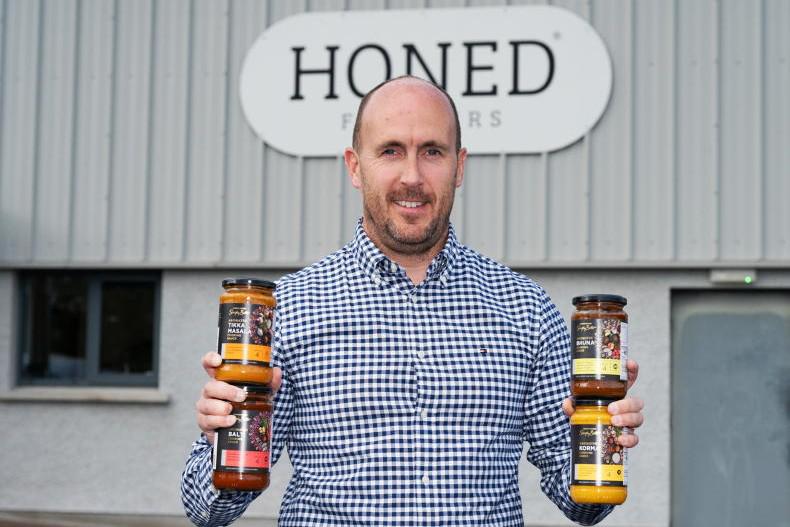
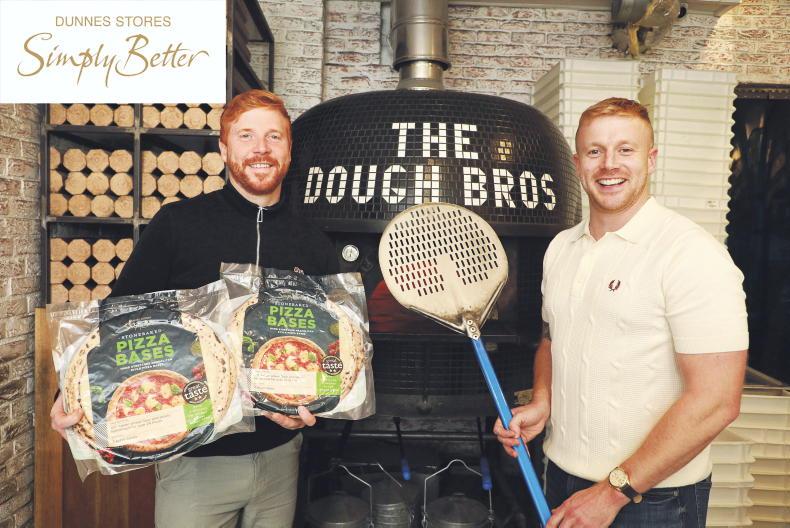


SHARING OPTIONS